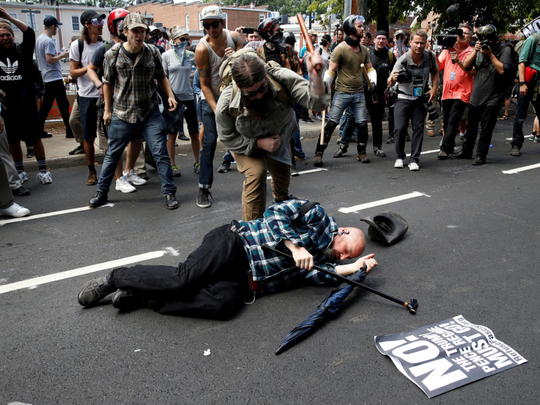
My heart goes out to the families of the those who died in Charlottesville, Virginia. My head reaches out towards the question of what’s to be done, but my heart knows few are ready yet for solutions. The grief is too profound — grief not only for lives lost, not only for a resurgence of white nationalism and domestic terrorism, not only for the erosion of commitments to non-violence, but also for a country of promise that has become a land of bitter strife.
We all can see the depth of our division. It shows itself not only in neo-Nazi salutes and racist chants, counterprotests and violence in the streets, but even in the vitriolic back-and-forth over internal business memos, as at Google, and in campus controversies from the renaming of Calhoun College at Yale to the struggle over final clubs at Harvard. We are engaged in a fight of some kind. Yet we have trouble understanding what it is.
What happened in Charlottesville makes everything look too simple. The fight, it would seem, is between neo-Nazis and those who resist them. And so it was recently. And, yes, white supremacy, racism and anti-Semitism are abhorrent ideologies. Yet the country’s struggle is new; it is not the fight of yesteryears. The simple fact of the matter is that the world has never built a multi-ethnic democracy in which no particular ethnic group is in the majority and where political equality, social equality and economies that empower all have been achieved. We are engaged in a fight over whether to work together to build such a world. And even those who are, in principle, willing to build that world are fighting with one another, for instance, over issues such as how the compelling state interest in non-discrimination, confirmed by the Supreme Court decades ago, interacts with rights of association and speech.
This fight is different than our earlier ones because this time everyone begins from the psychological position of fearing to be a member of a vulnerable minority. Experiences of uncertainty, anxiety and endangerment are widely spread. Out of such soil grows the poison plant of extremism. This brings us to the challenge. How can we name extremism — condemn neo-Nazi and white-supremacist ideologies — without losing sight of our collective responsibility to restore health to the dark soil out of which these, and other forms of extremism, grow?
We need to counter extremism’s violence with the tools of law and justice. We need to counter extremism’s ideologies with principles of non-violence and with a vision for a country in which no one feels endangered on account of their social identity.
If those who died in Charlottesville will not have died in vain, then we will make this moment a turning point. We will call domestic terrorism what it is and our law-enforcement bodies and judicial institutions will address it. We will forswear violent protest and lock arms across boundaries of difference to revive commitments to non-violence. We will see the full range of experience in this country — rural, suburban and urban; poor, middling and rich; atheistic, agnostic and faithful; gay, straight and bisexual; male, female and trans; Latino, Asian, white, black, Native American, multiracial and everything in between. Across this full range of American life and its dizzying, dazzling array of intersections, we will find ways to ward off desperation and chaos. Our goal lies not behind us, but before us. Having never been achieved in the world, it is not something that can be achieved “again.” May we dig deep, to find the soil of love, and make America great at last.
— The Washington Post
Danielle Allen is Director of the Edmond J. Safra Centre for Ethics and James Bryant Conant University Professor at Harvard University.










